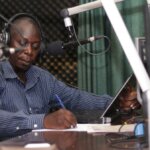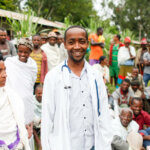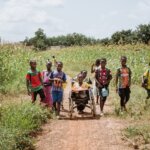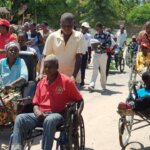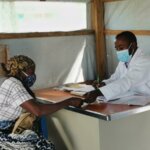- Disability Rights
- Humanitarian Action
A unique series of radio polls gives voice to people with disabilities in some of Uganda’s poorest communities.
In April, Light for the World teamed up with NGO TRAC FM to find out how COVID-19 has affected people with disabilities in Uganda. Through free SMS, basic mobile phone technology and radio talk shows, TRAC FM reaches out to the most remote and excluded people – including people with disabilities. It enables the most marginalised to debate about policies that concern them directly.
From 22nd of April to 19th of May, we worked with TRAC FM to air four polls on Let’s Talk, a specially created radio show. Broadcast on five local stations across the country, the show asked listeners how they were faring under Uganda’s lockdown. An average of just under 13,000 people responded to each poll question, giving rise to reflections that we’ve captured in Let’s Talk, a new report that should have wider resonance beyond Uganda.
Putting food on the table
So, what exactly did we find out? Above all, people are worried about feeding their families. This was the case for 45% of respondents with disabilities and their carers and 39% of respondents without disabilities.
“Before the coronavirus outbreak, I used to do business,” says Lillian, a farmer with a physical impairment. “I was employed by someone else, but now I have been left without any payment [salary] and it has made us go hungry many times since we do not have anywhere to get food from.”
With markets shut down, farmers have been unable to sell their crops, while salary cuts and lay-offs plus rising prices have made it difficult for people to provide for their families.
Of least concern were fears of actually getting the virus. To date, Uganda has had about 1,000 coronavirus cases and around 4 deaths at the time of writing – which probably accounts for the lukewarm anxiety: just 14% of people with disabilities and 15% of people without said that catching the virus was their main worry.
“In short, many people with disabilities in Uganda are too busy getting food on the table to worry about the implications of COVID-19,” says Anneke Maarse, Light for the World’s Uganda Country Director.
Livelihoods under lockdown
The lockdown has undoubtedly taken a heavy toll on people’s livelihoods, particularly people with disabilities. 43% of respondents with disabilities and their carers said that they depend on what others give them in order to meet their basic needs, compared to 31% of those without disabilities. Ugandan census records have shown that households headed by people with disabilities are 38% more likely to live in poverty than those without disabilities.
The relationship between poverty and disability is undeniable. In addition to physical, psychological or sensory impairments, people with disabilities face discrimination and negative attitudes. These make it much harder for people with disabilities to get work and be autonomous, forcing them to rely on others for help.
“We planted some crops but right now they are not ready for harvest so sometimes we lack food to eat,” says Ben, who has a hearing impairment. “We share food with our neighbours. When they have, they give us, and when we have, we will also give them.”
A simple solution
The hardship that Ben, Lillian and so many others are experiencing can be easily addressed through the effective distribution of relief. Providing food assistance to the most vulnerable groups – which includes a majority of people with disabilities – reduces the financial burden on households.
With their most basic needs taken care of, people with disabilities will be able to re-focus their attention on setting up alternative businesses or finding solutions to keep their existing livelihoods afloat, as well as supporting the nation’s wider efforts to reduce the spread and impact of the COVID-19 crisis.
There’s no doubt that supporting people with disabilities through the pandemic makes long-term economic and social sense. It’s a simple solution that would work not just in Uganda, but also in countries across the world.

